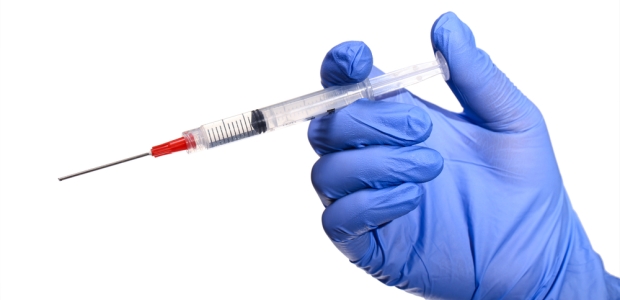
WHO Urges Worldwide Use of 'Smart' Syringes
Syringes without safety features cost 3 to 4 cents apiece when procured by a UN agency for a developing country. "Smart" syringes cost at least twice that much. WHO called on donors to support the transition to these devices, anticipating that prices will decline over time as demand increases.
Saying the use of the same syringe or needle to give injections to more than one person is driving the spread of a number of deadly infectious diseases worldwide, the World Health Organization on Feb. 23 called for the worldwide use of "safe" syringes. Millions of people could be protected from infections acquired through unsafe injections if all health care programs switched to syringes that cannot be used more than once, the UN agency stated as it launched a new policy on injection safety.
WHO said a 2014 study it sponsored, which focused on the most recent available data, estimated that in 2010, up to 1.7 million people were infected with hepatitis B virus and as many as 315,000 were infected with hepatitis C and as many as 33,800 with HIV through unsafe injections.
WHO's new safety guidelines and policy contain detailed recommendations highlighting the value of safety features for syringes, including devices that protect health workers against accidental needlesticks. Also, WHO stressed the need to reduce the number of unnecessary injections as a critical way of reducing risk. There are 16 billion injections administered every year; about 5 percent of them are for immunizing children and adults and 5 percent are for other procedures, such as blood transfusions and injectable contraceptives. The remaining 90 percent are given into muscle (intramuscular route) or skin (subcutaneous or intradermal route) to administer medicines. "In many cases these injections are unnecessary or could be replaced by oral medication," WHO noted.
"We know the reasons why this is happening," said Dr. Edward Kelley, director of the WHO Service Delivery and Safety Department. "One reason is that people in many countries expect to receive injections, believing they represent the most effective treatment. Another is that for many health workers in developing countries, giving injections in private practice supplements salaries that may be inadequate to support their families."
"Adoption of safety-engineered syringes is absolutely critical to protecting people worldwide from becoming infected with HIV, hepatitis, and other diseases. This should be an urgent priority for all countries," said Dr. Gottfried Hirnschall, director of the WHO HIV/AIDS Department.
The "smart" syringes WHO recommends for injections into the muscle or skin have features that prevent reuse. Some models include a weak spot in the plunger that causes it to break if the user attempts to pull back on the plunger after the injection. Others have a metal clip that blocks the plunger so it cannot be moved back, while in others the needle retracts into the syringe barrel at the end of the injection.
The organization is also calling for policies and standards for procurement, safe use, and safe disposal of syringes that have the potential for reuse in situations where they remain necessary, including in syringe programs for people who inject drugs. Continued training of health workers on injection safety, which has been supported by WHO for decades, is another key recommended strategy. WHO called on manufacturers to begin or expand production as soon as possible of "smart" syringes that meet its standards for performance, quality, and safety.
"The new policy represents a decisive step in a long-term strategy to improve injection safety by working with countries worldwide. We have already seen considerable progress," Kelley said.